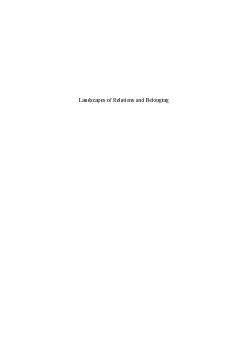
Additional Information
Book Details
Abstract
Wogeo Island is well-known to anthropologists of Papua New Guinea through the work of Ian Hogbin. Based on substantial fieldwork, the author builds on and expands previous research by showing how Wogeos establish and maintain social relationships and identities connected to place and movement in the physical landscape. This innovative study demonstrates how Wogeo worldviews and social organization can be described in relation to terms of movements, flows and placements in the landscape while, in turn, the landscape is constituted and made meaningful through people’s activities and buildings. The author not only addresses some of the key issues in contemporary anthropology concerning place, gender, kinship, knowledge and power but also fills an important gap in Melanesian ethnography.
Astrid Anderson has a doctoral degree in social anthropology from the University of Oslo and is presently a senior academic librarian at the University of Oslo Library.
“Classic Melanesian ethnographies are… sometimes dismissed as irrelevant in the face of a concern with local engagement with global processes. In contrast, the reflexive potential of anthropology is demonstrated in this book, which revisits, enhances and improves on the insights of a previous good ethnographer at the same time as it offers new material from a contemporary fieldworker equipped with a different analytic toolkit.” · Pacific Affairs
“In this monograph, Astrid Anderson takes us through in depth ethnographic descriptions of Wogeo life worlds and how meaning is created in what Anderson sees as a dialogical relationship between embodied experience and representation...This is a well written monograph and as a reader one gets a thorough understanding of Wogeo life worlds. The book is a rich contribution to Melanesian ethnography.” · Norsk antropologisk tidsskrift
“…the book offers a large corpus of valuable ethnographic data, which can be further analysed and used for comparative purposes, and provides a powerful case for those interested in the politics and gender of movements and placements as an alternative to the more conventional studies of kinship, social organization, and leadership in Papua New Guinea.” · Oceania
“Anderson has taken us through several ‘journeys’ as we explore the world of the Wogeo…The result is a crisp yet complex formulation of her perspective as she strives to stay true to the details that Wogeo advocates shared with her. The responses of those Wogeo and other Pacific peoples who read this ethnography will be watched with interest.” · Anthropological Notebooks
“This is an honest piece of work, refreshing in its matter-of-fact tone of voice and thorough engagement with the regional and theoretical literatures. I would say it is a model for the enduring power of participant-observation based fieldwork and ethnographic analysis.” · Anthropos
